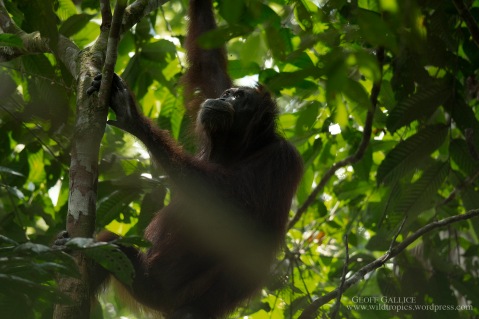Wild orangutans of Borneo

This is a captive orangutan at the Los Angeles Zoo, one of about 900 or so orangutans living in captivity across the world’s network of zoos. Although considered critically endangered by the IUCN, there are still many more orangutans living in the wild than in zoos—something which, sadly, cannot be said for many other critically endangered wildlife species.
Although the global population of wild orangutans is, at this moment, much larger than the captive population, it is crashing—and fast. Only two decades ago, essentially the entire island of Borneo in southeast Asia—including the Malaysian states of Sabah and Sarawak and Kalimantan in Indonesia, which today are home to about 50,000 orangutans—was draped in luxuriant, old-growth rainforest. The trees were dominated by one tropical family: the Dipterocarpaceae. Dipterocarp trees can grow to over 80 meters tall, among the tallest tropical trees in the world. Only twenty years ago, in the shadows of the great dipterocarps, roamed around 100,000 wild orangutans. In only two decades, the population has been reduced by half.
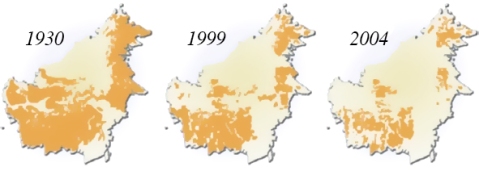
Disappearing orangutan habitat in Borneo, more than half of which has already been lost. The population has been reduced by a similar number, with no sign of slowing. Map by Ministry of Forestry, Indonesia.
Today, the majority of the island of Borneo is covered in just one species of tree: Elaeis guineensis, or the African oil palm. When the palm oil fever took hold here, the rainforest quickly gave way. Since oil palms take roughly 5 years to start producing oil, the felling of the valuable dipterocarp forests subsidized the initial waiting period. Once they started producing, the profits from the sale of the oil lined the pockets of a few large producers and a wave of quick wealth spread across Borneo. Since the trade in palm oil is so lucrative, native forests that are cut for palm oil tend to stay cut. Worst of all, conversion of dipterocarp forests—the only home to wild orangutans on the planet—is currently not slowing down.
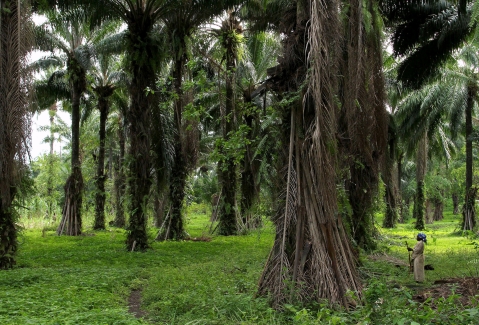
As its name suggests, the African oil palm originated in Africa. It grows very well, however, in tropical southeast Asia, including across the entire range of the orangutan in Borneo. Except for a short layer of ground cover, oil palms planted in rows shade out all other plant life, resulting in green biological ‘deserts’. Photo by Daniel Rosenberg.
With the global population teetering at nearly 7 billion and growing along with the demand for natural resources as affluence spreads in developing countries, the plight of the wild orangutan seems inevitable. Tropical forests suffer disproportionately, due to the complexities of global trade—developing countries in the world’s tropics seem to be scrambling to convert their forests into tangible wealth, and developed and developing countries alike seem to have an insatiable demand for the products that come from the forest. The scale of the problem—including in Borneo, where palm oil is replacing orangutan habitat to satisfy global demand—can seem overwhelming, hopeless.
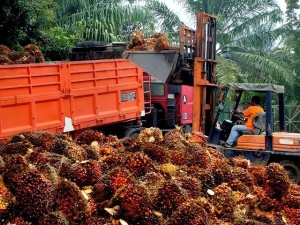
Oil palm fruits, from which palm oil will be extracted, are harvested in Dampung Sepakat, peninsular Malaysia. Photo by Ahmad Fuad Morad.
Until my recent trip to Borneo, I thought I had at least a rudimentary understanding of the palm oil dilemma there. When I flew over the island, however, I was taken aback by the true extent of the devastation: looking out the window of the small twin-prop plane during my one hour flight across the island, I saw almost nothing else. Palm oil plantations are interrupted only by small clearings in which their owners place refineries and, although they are very green and vast, they are essentially biological deserts—the overwhelming majority of species found in the native dipterocarp rainforests are completely absent in the plantations. Orangutans that are not killed or taken as pets by planters do not find food here and either starve or try to go elsewhere. Sadly, for many there is nowhere else.
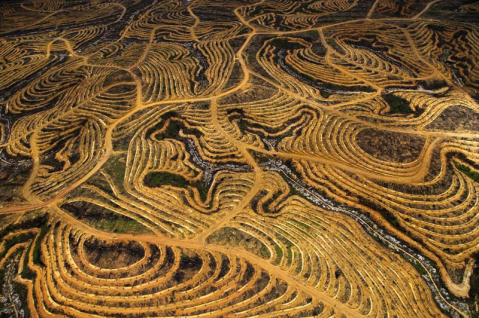
To maximize profits, a rainforest in Indonesia is completely razed to make way for a vast oil palm plantation. Orangutans and other wildlife have nowhere to go when their habitat is converted at this scale.
For me, my experience flying over Borneo was the first time such a monumental environmental disaster presented itself so clearly: native forests and orangutan habitat are being cleared for just one single commodity, planted in neat rows in all directions. The solution—in theory at least—was also clear: stop buying palm oil! Unfortunately, palm oil is an incredibly versatile food product, and it’s found in nearly everything processed. In addition, the demand goes far beyond just the developed world, where people are much less likely to take interest in the abstract consequences of their actions as consumers. Frankly, a palm oil boycott is unlikely to have a decisive effect any time soon on the wild orangutan population.
Luckily, there are other things one can do. There are a number of organizations working in Borneo and southeast Asia to conserve threatened wildlife. The WWF Malaysia has a number of programs to save not only orangutans but also rhinos and pygmy elephants, and since they work very efficiently, every dollar you give goes a long way. Give this or any other nonprofit working in Borneo anything you can—500 dollars or just 5 dollars—it really will make a great difference.
Perhaps a more rewarding way in which you can help wild orangutans is to travel yourself to Borneo to see them. Borneo isn’t much of a destination on most Americans’ radar—it’s far away, and mysterious. But Borneo—and Sabah in particular, home to a large population of wild orangutans—is a very friendly place, with a well-developed infrastructure for tourism. By visiting this place and putting money directly into the pockets of the individuals and organizations working to save orangutans and other endangered wildlife, you are casting a vote for the protection of nature—ecotourism is one of the few economic incentives, if not the only economic incentive, to leave the forest standing. Without tourist dollars coming in, the forests will likely be cut. And what a wonderful reward for the traveller—to see one of the last remaining wild orangutans of Borneo, and in so doing help to ensure that our wild cousins, the ‘people of the forest’, have wild rainforests to roam, for now and forever.
